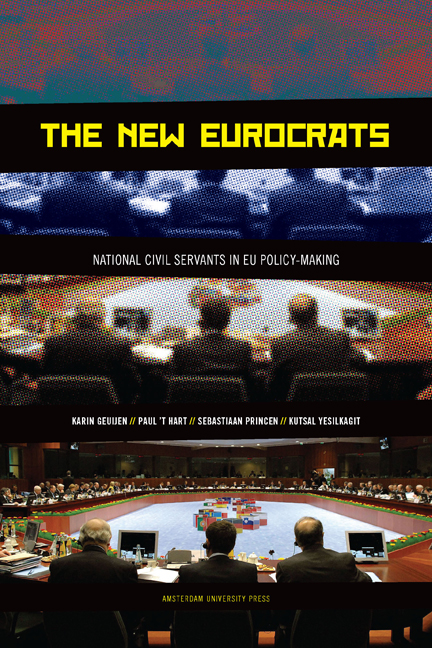Book contents
- Forntmatter
- Contents
- Tables and Figures
- Acknowledgements
- Chapter One Studying Eurocrats At Work
- Chapter Two Toward a Europeanised Civil Service? a Survey Study
- Chapter Three Eurocratic Work As Strategic Behaviour: Moving Before the Commission Does in Veterinary Policy
- Chapter Four Getting Things Done in European Police Co-Operation
- Chapter Five Bridge Builders Or Bridgeheads in Brussels? the World of Seconded National Experts
- Chapter Six Understanding Eurocratic Work: Conclusions and Reflections
- Appendix: Items on Europeansation Included in the ‘Pomo’ Survey
- Notes
- Bibliography
- About the authors
- Index
Chapter Three - Eurocratic Work As Strategic Behaviour: Moving Before the Commission Does in Veterinary Policy
Published online by Cambridge University Press: 15 January 2021
- Forntmatter
- Contents
- Tables and Figures
- Acknowledgements
- Chapter One Studying Eurocrats At Work
- Chapter Two Toward a Europeanised Civil Service? a Survey Study
- Chapter Three Eurocratic Work As Strategic Behaviour: Moving Before the Commission Does in Veterinary Policy
- Chapter Four Getting Things Done in European Police Co-Operation
- Chapter Five Bridge Builders Or Bridgeheads in Brussels? the World of Seconded National Experts
- Chapter Six Understanding Eurocratic Work: Conclusions and Reflections
- Appendix: Items on Europeansation Included in the ‘Pomo’ Survey
- Notes
- Bibliography
- About the authors
- Index
Summary
Representing the ‘national interest’ in Brussels
The senior echelons of the various departments that national Eurocrats work for expect them to make sure their department's view of the world is successfully presented when EU policies are being created (or implemented). To do this job well, Eurocrats need to know about the plans and intentions of ‘their’ Directorate-General at the European Commission early on in the policy process. Furthermore, they need to be able to sense where the Commission is heading with a particular proposal; assess the implications for their department in terms of costs and benefits for the domestic policy status quo; discuss these plans with their colleagues in other units within their own department or with colleagues with related or affected portfolios in other departments; involve external experts and write reports; and finally, determine their department's position with regard to the specific policy issue at hand. Their socialisation on the job and their work routines are geared towards performing these tasks.
The literature on Europeanisation abounds with ‘big picture’ studies of the politics of the European public policy-making process (Wessels and Rometsch 1996; Scharpf 2001; Green-Cowles et al 2001; Featherstone and Radaelli 2003), but there is surprisingly little research on the behaviour of the countless individual officials that lie at the core of the process (Thedvall 2006; Larue 2006). This chapter takes the latter view. It examines how individual Dutch civil servants practice public policy-making for and within European arenas. By employing this focus, we aim to shed a different light on the question of where ‘European’ policy-making ‘happens’ and how – in our case, Dutch – civil servants ‘make it happen’.
We will, however, look beyond just the practices of individual Eurocrats. The strategic interaction with other Eurocrats is part and parcel of a civil servant's work, which includes colleagues from other member countries, their superiors at their home departments, and the officials of the Commission and the Secretariat of the Council. Getting things done in Europe entails a strategic effort to produce timely, coherent and sensible national policy positions, and to build support for these at the European level. Thus, the work of most individual Eurocrats is embedded in two arenas of strategic interaction: departmental and interdepartmental preparation and the co-ordination arenas at the national level; and Commission and Council Secretariat counterparts and arenas at the European level.
- Type
- Chapter
- Information
- The New EurocratsNational Civil Servants in EU Policy-making, pp. 51 - 76Publisher: Amsterdam University PressPrint publication year: 2008

